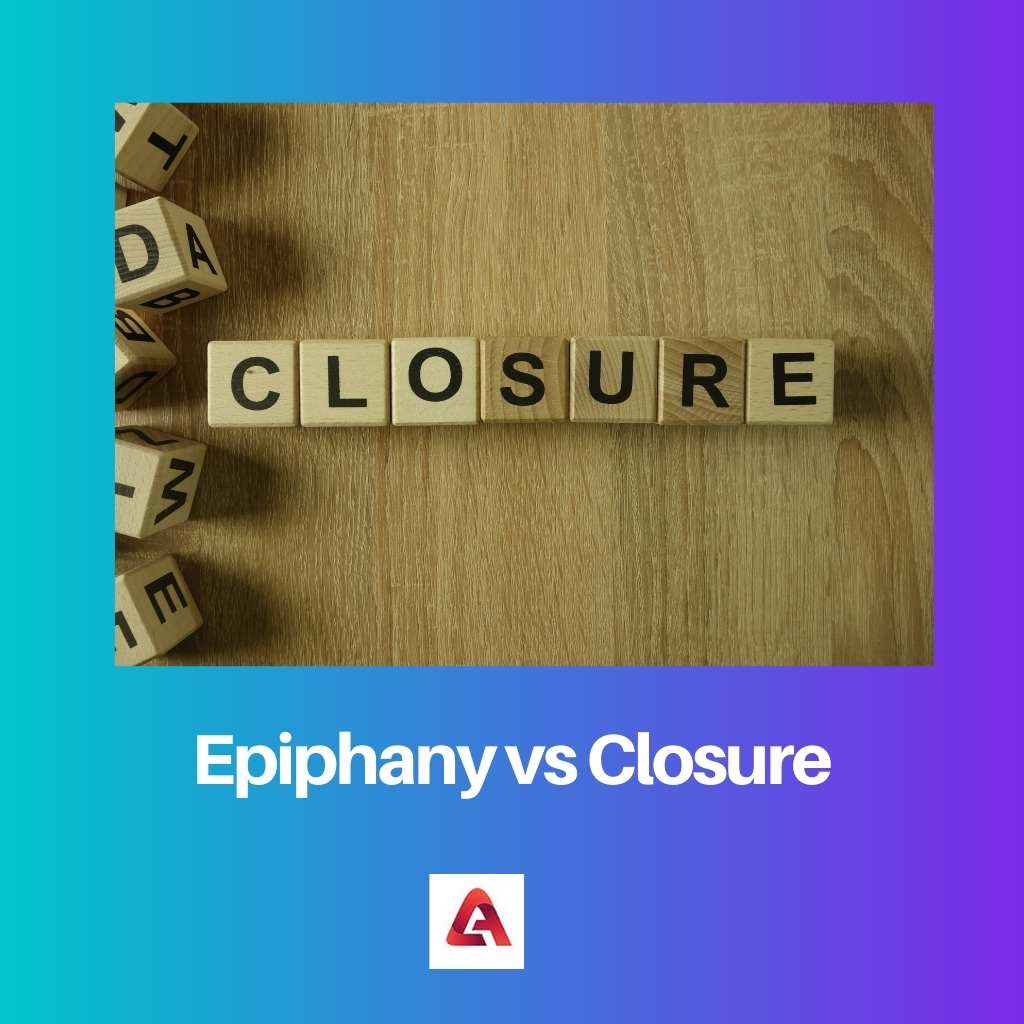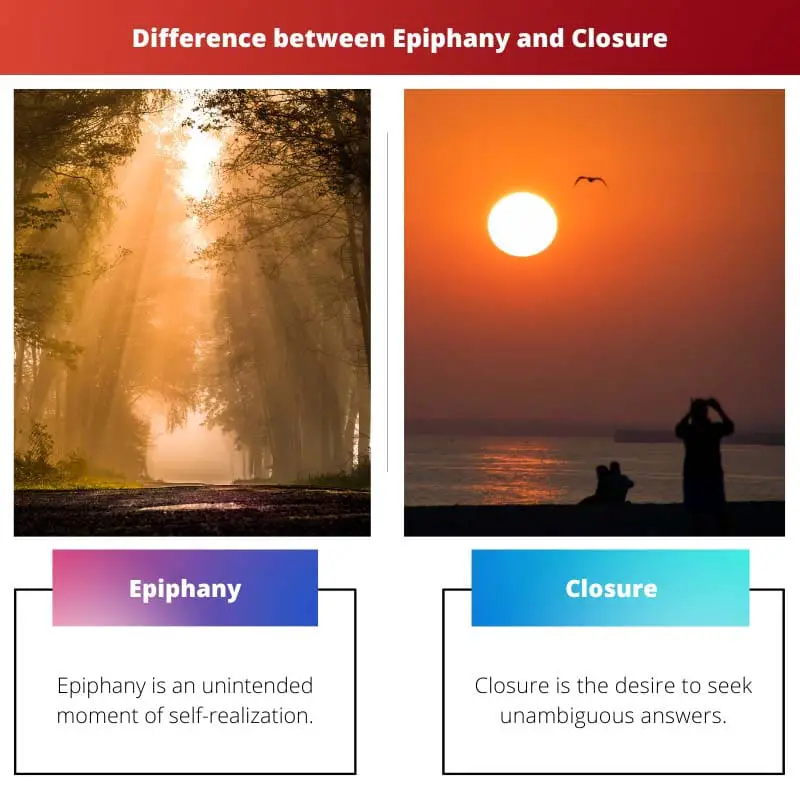The most common dilemma that every reader or writer faces is when they get confused between the meaning of different words.
There are more than one million words in English, and it isn’t possible to remember all of them. Two such words that are frequently confused are Epiphany and Closure.
Key Takeaways
- An epiphany is a sudden, profound realization or insight that leads to a deeper understanding of a situation or a problem.
- The closure is emotionally resolving or coming to terms with a difficult or painful situation, achieved by finding answers or gaining acceptance.
- Both epiphany and closure involve reaching a new level of understanding, but an epiphany focuses on sudden insight, while closure emphasizes emotional resolution.
Epiphany vs Closure
The difference between Epiphany and Closure is that Epiphany refers to a sudden inner realization. On the other hand, Closure is defined as the desire of a person to seek answers to their questions. Moreover, Epiphany is unintended and happens in the most unusual situations, whereas Closure is intended.

Epiphany describes a moment when a person goes through a situation that suddenly changes their perception of themselves and the world.
An Epiphany can occur because of self-questioning and seeking answers, but often, it happens when it is least expected and involves other people in some manner.
The closure is a social and psychological desire to seek unambiguous and straightforward answers. It provides people with a way to better understand their lives and everything that happens, easing their lives.
People seeking Closure seek solutions that can explain the dilemmas in their life so that they can solve them.
Comparison Table
| Parameters of Comparison | Epiphany | Closure |
|---|---|---|
| Definition | Epiphany is an unintended moment of self-realization | Closure is the desire to seek unambiguous answers |
| Word origin | Epiphany originated from the Greek word epiphainein, meaning “sudden manifestation.” | Closure originated from the Late Latin word claudere meaning “coming near a close” |
| Type of desire | Epiphany isn’t desired | Closure is a form of social-psychological desire |
| Intentions | Epiphany is sudden and unintended. | Closure is intended as a person seeks it explicitly. |
| Use in literature | Epiphany is used to describe sudden manifestations in the character’s life | The Closure is used to provide the narrative an end |
| Relation with Christianity | Epiphany is a Christian festival that celebrates the manifestation of Christ. | Closure isn’t explicitly related to Christianity. |
What is Epiphany?
Epiphany is a state of mind where a person discovers knowledge that changes their perception. This change in perception brings specific changes in the person and provides them with a different viewpoint.
With the new point of view, the person starts to perceive things differently and can accomplish things that were previously considered impossible by them.
“Epiphany” originated from epiphainein, a Greek word that means “relief” or “manifestation.” Also, etymologists connect the roots of the word “Epiphany” with the Old French word epiphanie meaning “to show”, and the Latin word epiphania meaning “to manifest” or “show.”
Epiphany is a literary device highly used for depicting the situation when a character goes through moments of realization and changes in perception and personal philosophy.
James Joyce first used the word Epiphany in his novel A Portrait of the Artist as a Young Man. Later, it was adapted by authors like Marcel Proust, Virginia Woolf, Katherine Mansfield, and others.
Epiphany holds an essential place in Christianity. It was an occasion when Jesus Christ was incarnated into humanity as God.
However, Eastern and Western Christians celebrate this occasion differently, but the similarity is that both celebrate the manifestation of Jesus Christ.
What is Closure?
The closure is a person’s desire to seek complete and straightforward explanations to their questions. When a situation is open to multiple interpretations, a person seeks unambiguous answers to understand it better and act accordingly.
In other words, Closure is a social-psychological desire that allows people to understand themselves and the world around them.
The word “Closure” was developed from multiple words, but its roots trace back to the Late Latin word claudere meaning “approaching the end.”
Also, “Closure” evolved from the Late Latin word claus- meaning “closed,” Clausura meaning “a closing,” and the old French word closure meaning “enclosure” or “covering.”
The closure is used as a literary device to provide an end to a narrative without explicitly marking the end. Alternatively, a writer uses Closure to end a description with an indication rather than something specific.
However, the reader can extend the narrative or anyone else as it isn’t permanently ended.
In psychology, Closure is also called Need for Closure (NFC) or Need for Cognitive Closure (NFCC).
According to the theories of NFCC, people seek Closure to interpret better and understand multiple situations because Closure provides the necessary motivation needed to successfully and efficiently complete specific tasks.
Main Differences Between Epiphany And Closure
- Epiphany is an unexpected situation where a person goes through magnified realization. On the other hand, Closure is the tendency of a person to find firm and simple answers to their questions.
- Epiphany originated from epiphainein (a Greek word) that means “manifestation” or “realization.” On the other hand, Closure originated from claudere (a Late Latin word) that means “approaching a close.”
- No one desires epiphany, whereas Closure is a psychological and social desire.
- Epiphany isn’t intended and is sudden and comes with a surprise. But, on the other hand, Closure is needed and therefore intended.
- In literature, Epiphany is used to depict changes in the perception of a character. On the other hand, Closure is used to provide an uncertain end to the narrative.
- Epiphany is a Christian holiday celebrated as the day when Christ was manifested amongst humanity, whereas Closure isn’t related to Christianity.

- https://oxfordre.com/classics/DocumentId/acrefore-9780199381135-e-2456
- http://ai-makurdi.org/wp-content/uploads/2020/04/68.-Contemporary-Debates-in-Epistemology-by-Matthias-Steup-John-Turri-Ernest-Sosa-1.pdf#page=56
